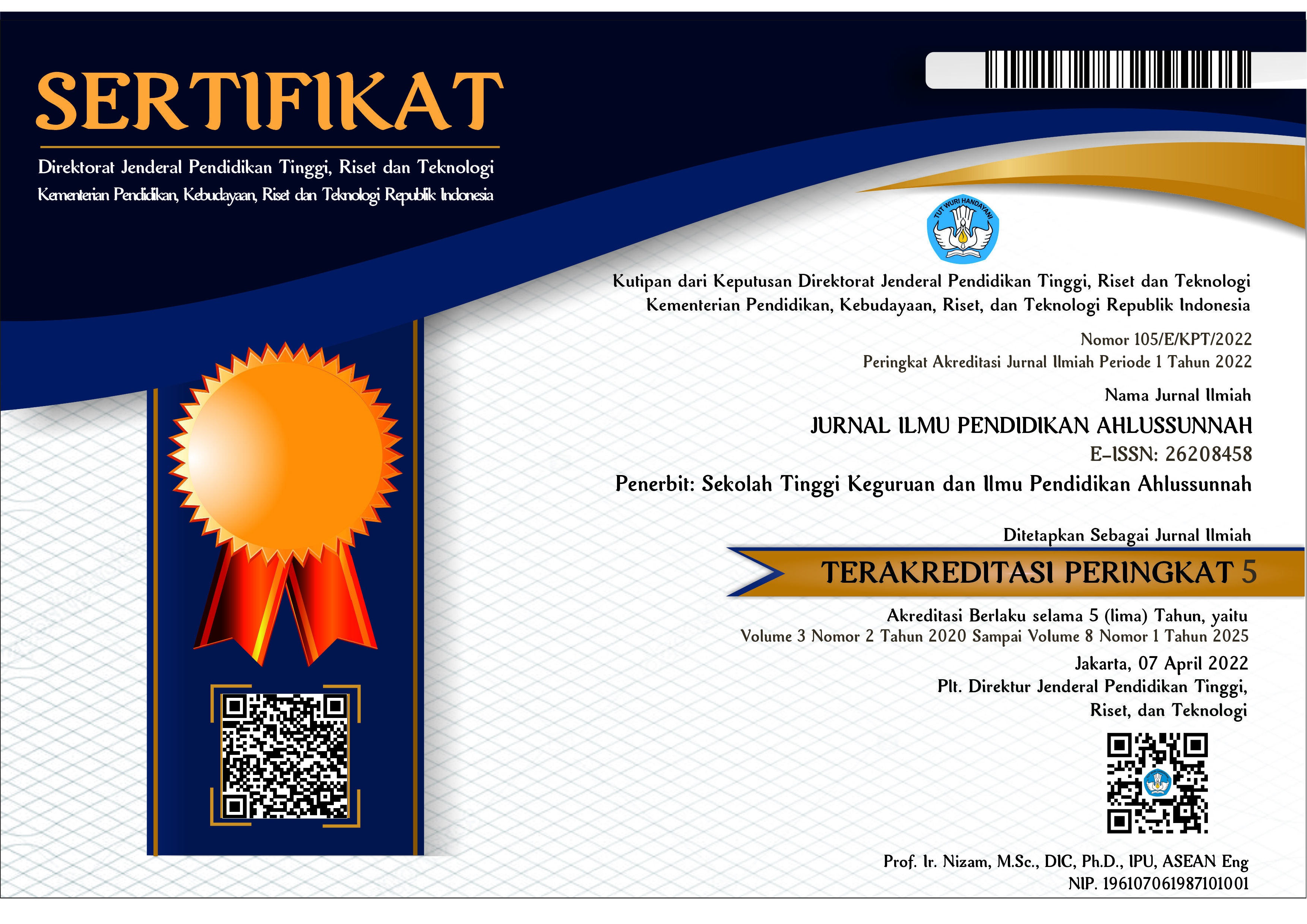DEVELOPMENT OF ANTI CORRUPTION BASED CITIZENSHIP EDUCATION BOOKS AT UNIVERSITY
PENGEMBANGAN BUKU AJAR PENDIDIKAN KEWARGANEGARAAN BERBASIS ANTI KORUPSI DI PERGURUAN TINGGI
Abstract
The high rate of corruption in the world is a serious problem globally. Indonesia in 2021 based on data from Transparency International Indonesia, the results of the corruption perception index are ranked 96th out of 180 countries. Referring to this phenomenon through Citizenship education, it is necessary to have an anti-corruption-based textbook. This research aims to develop textbooks on Citizenship Education Based on Anti-Corruption in Higher Education that are valid and practical for the course Citizenship Education in Higher Education. The process of developing this textbook refers to the Plomp development model. The results of the study showed that the validity of Anti-Corruption-Based Civics textbooks on the validity criteria was very valid with an average Aiken's v 0.81. The practicality of textbooks is in the practical category with an average of 3.71. Student learning activities with anti-corruption-based Civics textbooks with phases: problem orientation, hypotheses, testing consequences, character exploration, presentations, self-reflection. Based on these results, the Anti-Corruption-Based Civic Education textbook meets valid and practical criteria and is expected to be an alternative reference for improving the quality of civic education learning, especially in anti-corruption education.
References
Arikunto, S. (2015). Prosedur Penelitian: Suatu Pendekatan Praktik. Rineka Cipta.
Azwar, Saifuddin. 2017. Metode Penelitian Psikologi Edisi II. Yogjakarta: Pustaka Pelajar.
Balogun, I. N., & Yusuf, A. (2019). Teaching Civic Education to Learners through Best Practices. Anatolian Journal of Education, 4(1), 39-48. https://doi.org/10.29333/aje.2019.414a
BSNP. 2014. Permendikbud Nomor 59 Tahun 2014 tentang Standar Proses Pendidikan Dasar Dan Menengah. Kemendikbud. Jakarta. BSNP. 2016. Permendikbud No. 23 Tahun 2016 tentang Standar Penilaian Pendidikan. Kemendibud. Jakarta.
Child, Travers and Wright, Austin L. and Xiao, Yun and Xiao, Yun, Aid Fragmentation and Corruption (October 31, 2020). Available at SSRN
Dimant, Eugen& Guglielmo Tosato, 2017. Causes And Effects Of Corruption: What Has Past Decade's Empirical Research Taught Us? A Survey. Journal Of Economic Surveys. Volume32, Issue2. Doi: https://doi.org/10.1111/joes.12198
Grosseman, S., Hojat, M., Duke, P. M., Mennin, S., Rosenzweig, S., & Novack, D. (2014). Empathy, Self-Reflection, and Curriculum Choice. Interdisciplinary Journal of Problem-: https://ssrn.com/abstract=3543247 or http://dx.doi.org/10.2139/ssrn.3543247
Hadin, A. F., & Fahlevi, R. (2016). Desain Buku ajar Pendidikan Kewarganegaraan Berbasis Pendidikan Anti Korupsi Di Perguruan Tinggi. Jurnal Moral Kemasyarakatan, 1(2), 162–172. https://doi.org/10.21067/jmk.v1i2.1533
Herdi Wisman Jaya. 2021. Insersi Pendidikan Anti Korupsi Dalam Mata Kuliah Pendidikan Kewarganegaraan Di Perguruan Tinggi. Jurnal Pendidikan Kewarganegaraan. Volume 8 Jilid 1.
Indawati, N. (2015). Journal of Education and Practice www.iiste.org ISSN (Vol. 6, Issue 35). Online. www.iiste.org
Irsalina, A. dan Dwiningsih, K. 2018. Practicality Analysis of Developing the Student Worksheet Oriented Blended Learning in Acid Base Material. JKPK (Jurnal Kim. dan Pendidik. Kim., Vol. 3, No. 3, p. 171-182
Komalasari, K., & Saripudin, D. (2015). Integration of anti-corruption education in school’s activities. American Journal of Applied Sciences, 12(6), 445–451. https://doi.org/10.3844/ajassp.2015.445.451
Kusumadewi, Rida Fironika, Nuhyal Ulia, Yunita Sari. 2020. Pengembangan Buku ajar Matematika Berbasis Komik Digital Untuk Meningkatkan Minat Baca Siswa Sekolah Dasar. Phenomenon Jurnal Pendidikan MIPA 10 (1). Doi: 10.21580/phen.2020.10.1.6339
Marlina, Lina, Aryanti Dwi Untari. 2020. Pengembangan Bahan Ajar Teks PPKn Berbasis Discovery Learning Untuk Meningkatkan Pengetahuan Warga Negara Siswa Sekolah Menengah Atas. Jurnal Civics. Vol. 17.
Magdalena, Ina. 2020. Analisis Pengembangan Buku ajar. Nusantara: Jurnal Pendidikan dan Ilmu Sosial, 2(2) : 170-187
Misno, A. 2020. Development of Islamic Education (PAI) Curriculum Based on AntiCorruption Fiqh. International Journal of Psychosocial Rehabilitation 24 (3): 2434– 46. https://doi.org/10.37200/IJPR/V24I3/PR201891.
Montessori, M. (2021). Anti-Corruption as Value Learning in Senior High School. 10(2), 314–324. https://doi.org/10.23887/jpi-undiksha.v10i2.24375
Najih & Fifik, 2021. The Criticism of Land Procurement Law to Improve Landowners Welfare in Indonesia. Sriwijaya Law Review. Volume 5 Issue 2. Doi: http://dx.doi.org/10.28946/slrev.Vol5.Iss2.1073.pp175-191
Plomp, T., & Nieveen, N (2013) Educational Design Research: An Introduction. SLO. Netherlands Institute for Curriculum Development
Rahmat, M., & Yahya, M. W. B. H. M. (2022). The impact of inclusive islamic education teaching materials model on religious tolerance of Indonesian students. International Journal of Instruction, 15(1), 347-364. https://doi.org/10.29333/iji.2022.15120a
Rizqiyani, Eka Yanuar Indah. Ratna Sari Dewi, & Wika Hardika Legiani. 2022. Pengembangan Buku ajar Pendidikan Pancasila Dan Kewarganegaraanberbasis Problem Based Learning untuk Meningkatkan Civic Knowledge. Jurnal Kewarganegaraan. Vol. 6 No. 1. DOI: https://doi.org/10.31316/jk.v6i1.2235
Rozhana, K. M., & Anwar, M. F. (2022). Pengembangan Buku ajar Berbasis Multiple Intelligences untuk Meningkatkan Hasil Belalajar Siswa Sekolah Dasar. Jurnal Bidang Pendidikan Dasar, 6(1), 95–103. https://doi.org/10.21067/jbpd.v6i1.5957
Tabish, S. Z. S., & Jha, K. N. (2012). The impact of anti-corruption strategies on corruption free performance in public construction projects. Construction Management and Economics, 30(1), 21–35. https://doi.org/10.1080/01446193.2011.654128
Transparency International, (2021). What We Do. Diakses pada 30 Oktober 2021, dari www.transparency.org/en/research.
Tim Penulis Buku Pendidikan Anti Korupsi. (2011). Pendidikan Anti Korupsi untuk Perguruan Tinggi. Jakarta : Kemendikbud.
Tan, Tuan Zea, Qing Hao Miow, Yoshio Miki, Tetsuo Noda, Seiichi Mori, Ruby Yun-Ju Huang, and Jean Paul Thiery. 2014. Epithelial-mesenchymal transition spectrum quantification and its efficacy in deciphering survival and drug responses of cancer patients. EMBO Mol Med. Volume 6 No 10. Doi: 10.15252/emmm.201404208
Yulianeta Yulianeta, Aizan Yaacob, Arif Husein Lubis. The Development of Web-Based Teaching Materials Integrated with Indonesian Folklore for Indonesian Language for Foreign Speakers Students. International Journal of Language Education. Vol. 6, No. 1. Doi: https://doi.org/10.26858/ijole.v6i1.22957
Widoyoko, E. P. (2017). Teknik Penyusunan Instrumen Penelitian. Yogyakarta: Pustaka Pelajar
















